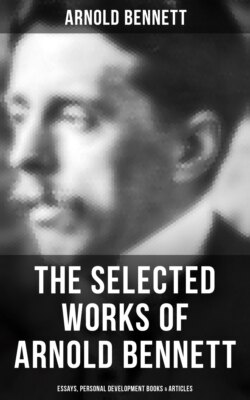Читать книгу The Selected Works of Arnold Bennett: Essays, Personal Development Books & Articles - Arnold Bennett - Страница 59
На сайте Литреса книга снята с продажи.
The Execution.
ОглавлениеBefore he begins to write out the story in full, he must have a clear, accurate, and complete idea of what he is going to write; he must have meditated so long upon his subject that he is full and running over with it He must have seen the scene, and he must know a great deal more about the scene than he can possibly put down. In order to increase the intensity of the imaginative effort which must accompany the writing of good fiction, he should take the story part by part and concentrate his mind entirely on each part as he executes it In writing the opening bit of action, for example, he should think of nothing but that particular fragment By this means, renewing the effort again and again as the story progresses, he will obtain better results than by dealing with the story as one indivisible whole.
He must be careful not to commit any small sins against the great law of Probability. In fiction, especially commercial fiction, you may steal a horse with impunity, but you are a rash fool if you look over a gate. In its essence, all fiction is wildly improbable, and its fundamental improbability is masked by an observance of probability in details. While the tyro, therefore, may be perfecdy aware that his central idea is somewhat strained, he should tolerate no avoidable straining in the details of its execution. His characters may be compelled to act in a manner contrary to human nature, but they need not make speeches contrary to human nature. And even if they are compelled to make speeches contrary to human nature, they need not employ phrases and turns of speech which no living person ever did employ. For instance, when Dick Trevelyan, aged twenty-five, meets Lady Mildred Trefusis, aged forty, after an absence of seven years, it is extremely improbable that Dick would return thanks to Lady Mildred for having spoken nicely to him when he was eighteen; young men do not do these things. Hence Dick should not make any such speech to Lady Mildred. But if for the purposes of the story such a speech from Dick is necessary, even then he need not be forced to say: “It was extremely kind of you, Lady Mildred, to deign to take notice of an unlicked cub:" Dick will more vitally impress himself on the reader if he talks as people do talk in real life. The writer must examine minutely every line of action and dialogue, and ask himself: “Now, is this right? Would this have occurred so? Would Dick have done this? Would Lady Mildred have said that in those words—?” And so on.
My tyro, before he has proceeded very far in his story, is fairly sure to get “stuck.” There are two ways of being “stuck.” Sometimes one feels what one wants to say, but cannot frame the idea in words, or cannot decide between several methods of presenting it. That way of being “stuck,” is normal and healthy. Sooner or later the obstacle will disappear and progress will be resumed. But when the writer suddenly comes to the end of his ideas, when he begins to cast about idly for “something to say next,” when he perceives an unbridged chasm between himself and the desired climax, then he should cry halt, and carefully consider his position, for he is on the way to certain failure. His best plan, under the sad circumstances, will be either to reconstruct the plot or abandon it entirely in favour of a new one.
He must arrive at his climax with verve and eagerness, or the story will drag. And when he has safely arrived at it, when the issue is decided and the reader’s interest appeased, the tale must be stopped, ruthlessly, then and there. The end of the interest, of the curiosity, is the end of the story.
It is impossible to advise the beginner about the multitudinous trifles of fictional writing. But I shall make two negative suggestions. He should not, as most beginners do, make his characters either anarchists or literary aspirants. And he should not, as most beginners do, label his characters with old family surnames, such as Trevelyan, Trefusis, Anstruther, Lascelles, &c. And if possible he should find less hackneyed Christian names for his heroes and heroines than Dick, Gerald, Muriel, and Enid.
No rule can be laid down about writing and rewriting. Some men say best what they have to say once for all at the first writing. Others produce a very careful draft, and make only minor alterations in a final writing. Still others produce a hasty draft at top speed, and then rewrite entirely. The beginner, after a little experience, will discover his own method by instinct The great thing is that he should not finish till he has done his best Every man knows the feeling which follows a conscientious endeavour completely fulfilled. Every man knows whether or not he is justified in the boast: “I cannot make this any better than it is.”
